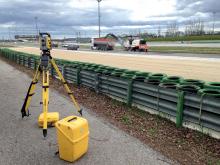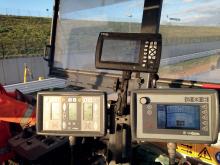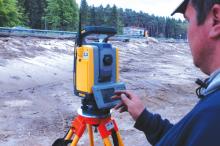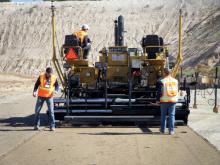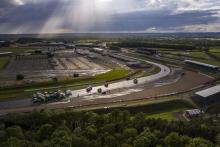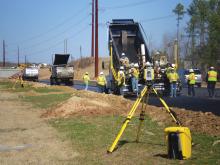When the call for tender was issued to modernise the track, the construction of two new track sections was also planned. These plans included measures to boost safety as well as increase speed.
The goal was to pave around 5,000tonnes of new road surface, requiring 80 workers and 50 vehicles. In addition to changing the longitudinal and cross slope of the track, all existing undulations and other irregularities had to be rectified. The use of 3D technology was stipulated in the technical specifications during both the planning and the implementation phases, to ensure precision.
The milling depth needed to be adjusted with millimetre accuracy during the milling work to remove irregularities from the track. Pesaresi Giuseppe opted to use its
Once the terrain had been surveyed in collaboration with a topology and engineering construction company, the 3D terrain profile for the Wirtgen cold milling machine W 210 was created and uploaded. Equipped with the Trimble PCS900 Paving Control System, the W 210 was then able to use the 3D profile.
Trimble technology ensured instant transitioning between the individual total stations for uninterrupted milling work. As a result, no bumps were caused by the machine stopping on the track.
The use of 3D technology also speeds up job processing, as the trucks do not have to avoid stringlines or stakes and they can move faster and more easily on the surface when transporting material away.
Work was completed in 14 working days, allowing asphalt paving work to begin. Just four days later, the job was finished, on time and to specification.
Race circuit milling job with machine control
The Misano racetrack in Italy has benefited from the use of the latest milling technology to deliver a new surface. Contractor Pesaresi Giuseppe decided to take advantage of the cutting-edge technologies of Wirtgen and Trimble. In less than three weeks, all irregularities were removed from the track, leaving it ready for motor sports racing.
When the call for tender was issued to modernise the track, the construction of two new track sections was also planned. These plans included measures to boost safety
High quality and productivity were achieved on the Misano circuit upgrade
The Misano racetrack in Italy has benefited from the use of the latest milling technology to deliver a new surface. Contractor Pesaresi Giuseppe decided to take advantage of the cutting-edge technologies of Wirtgen and Trimble. In less than three weeks, all irregularities were removed from the track, leaving it ready for motor sports racing.

